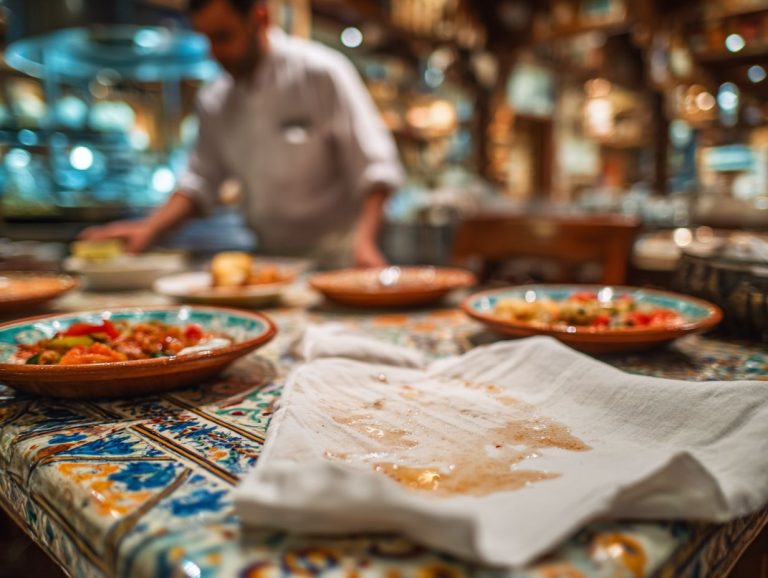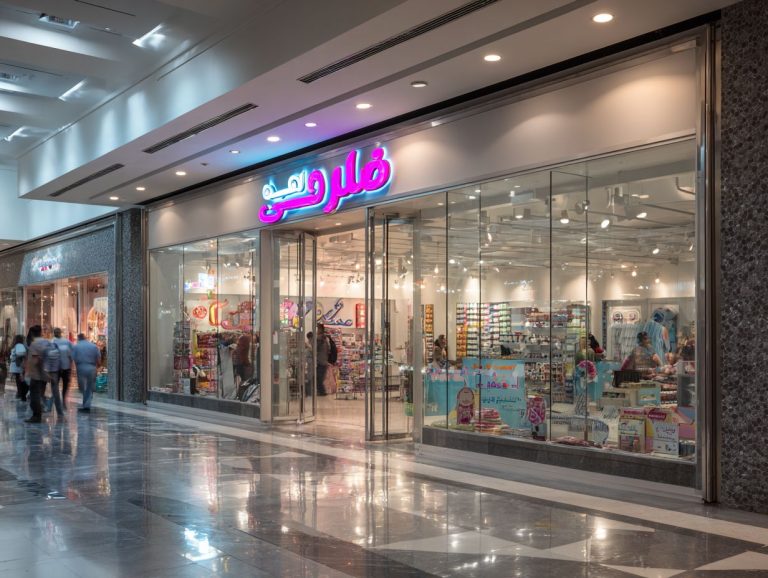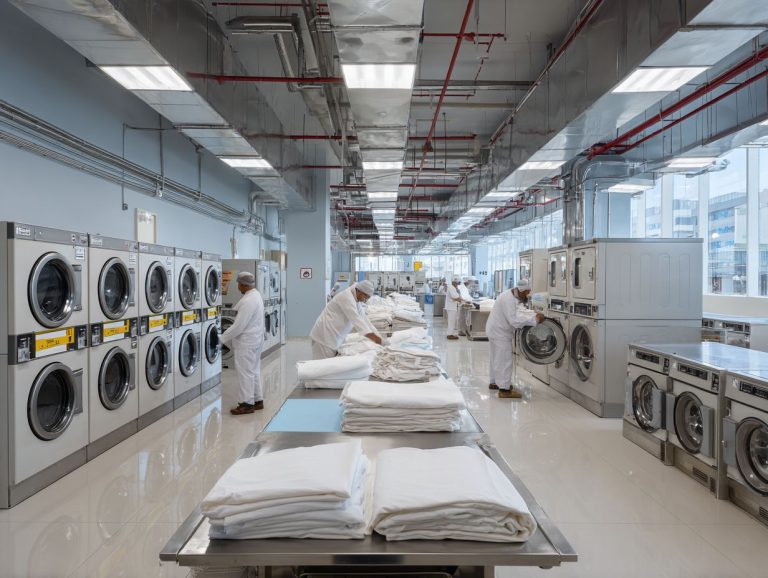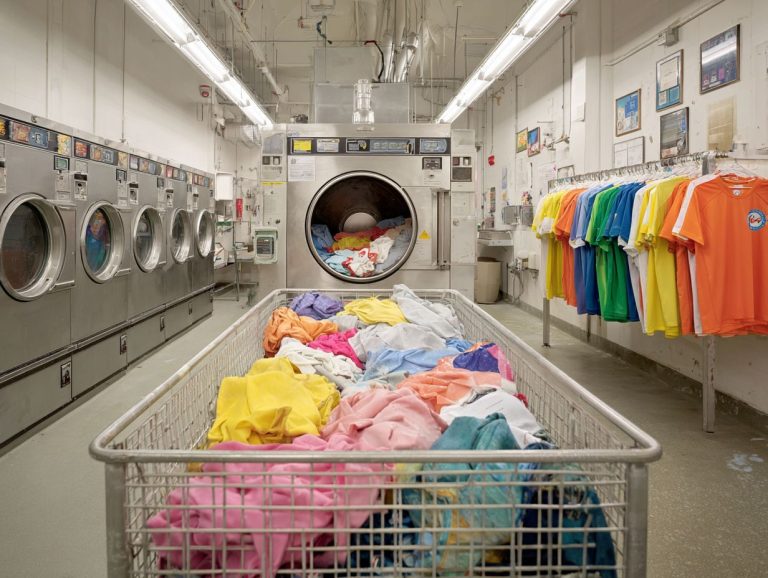Baby Clothes Washing: Gentle Care Guide
Taking care of baby clothes, soft toys, and other gentle items is important for your child’s well-being and comfort. Whether you’re a new parent or just want to improve your laundry habits, using mild detergents like Baya, Persil, and Bollicine will keep your fabrics clean and safe. This guide will walk you through essential washing tips for baby care, ensuring your child’s clothes remain soft and hygienic. For added convenience, trust The Laundry Hub for top-rated laundry services in Dubai, offering expert cleaning and real-time tracking to simplify your life.
Key Takeaways:
- Clean baby clothes are important for the health and well-being of your child.
- Knowing about fabric types and how to care for them is important for washing baby clothes correctly.
- Choosing hypoallergenic and fragrance-free detergents and using gentle washing methods can help keep your baby’s clothes safe and in good condition.
Why is Washing Baby Clothes Important?
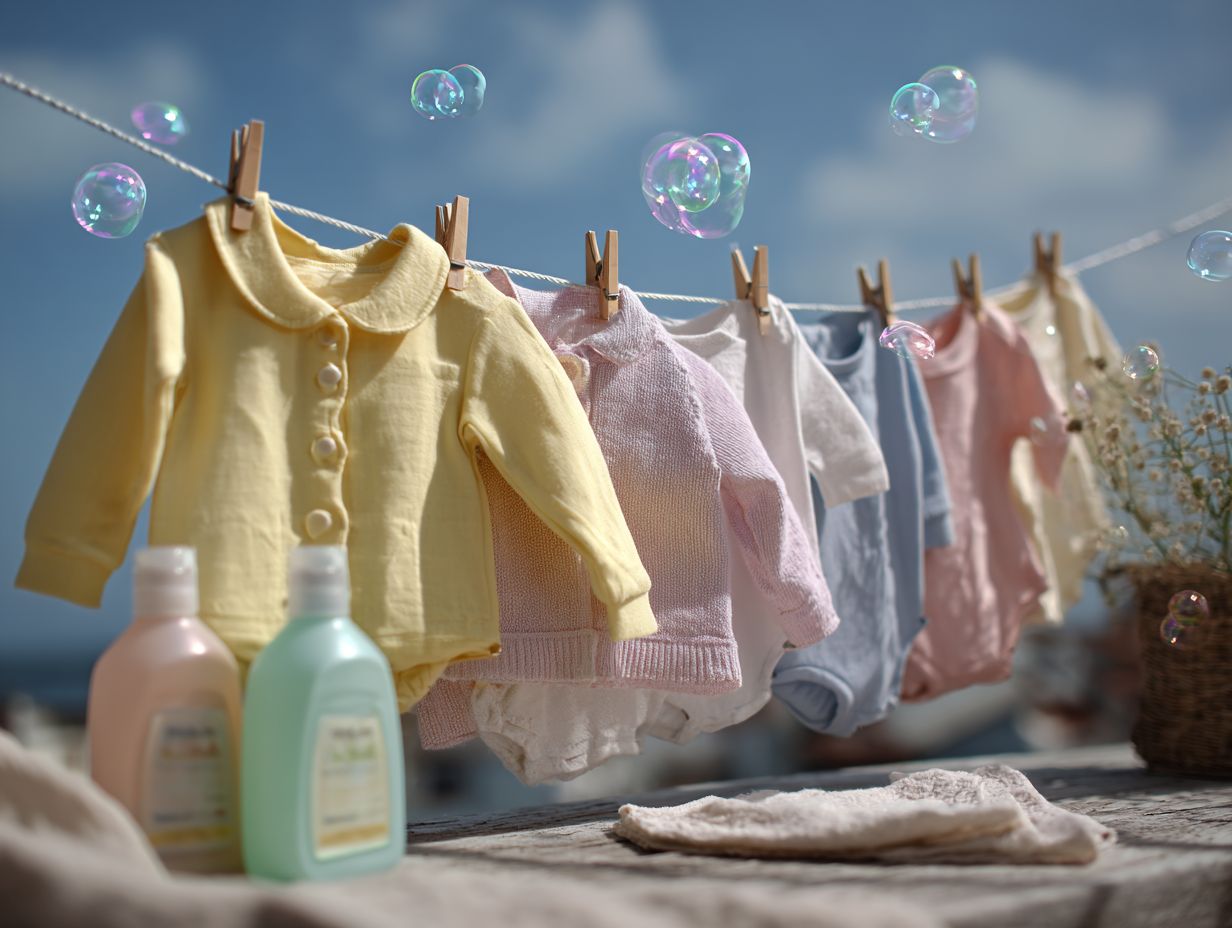
Regularly washing baby clothes is important for keeping infants healthy because it removes harmful substances and allergens that can irritate their sensitive skin. To maintain the longevity and vibrancy of their clothing, you might consider methods to prevent color fade during washes.
Health Benefits of Clean Baby Clothes
Clean baby clothes are essential for minimizing exposure to irritants and allergens that might trigger skin issues in newborns.
To effectively protect your baby’s sensitive skin, use hypoallergenic and fragrance-free detergents. Brands like Seventh Generation and Dreft’s Stage 1 are formulated to reduce skin irritation. It’s important to wash baby clothes before using them for the first time because new clothes often have leftover substances from production.
For ongoing care, consider setting a washing routine where you clean baby clothing separately from adult items, using a gentle cycle to further limit exposure to allergens. Parents have reported fewer instances of rashes and infections after adopting these practices.
What Materials are Common in Baby Clothes?
Baby clothes are usually made from gentle materials that need careful handling to keep them in good condition and comfortable for babies. To maintain their vibrant colors, it’s important to follow certain washing guidelines (our expert suggestions on preventing color fade provide valuable insights).
Fabrics and How to Care for Them
Different materials in baby clothes need different care methods to keep them lasting long and feeling soft. Cotton should be washed in warm water (30-40 degreesC) with a gentle detergent like Baya for optimal results.
For wool garments, hand wash in cold water and avoid wringing; instead, lay flat to dry to prevent shrinkage. Polyester blends can withstand machine washing at a maximum of 60 degreesC and require a mild detergent.
Improper washing, such as using hot water on wool, can lead to significant damage, so always read the care label to avoid mishaps.
How to Prepare Baby Clothes for Washing?
Getting baby clothes ready for washing is important to make sure they are cleaned well, especially when there are stains from food or diaper spills.
Sorting, Stains, and Pre-Treatment Tips
Sorting clothes correctly and removing stains effectively can significantly improve the process of washing baby clothes, ensuring they are fresh and clean.
- Start by sorting baby clothes into whites, colors, and darks. This stops colors from mixing, especially with bright items like red ones.
- For typical stains like formula or diaper leaks, clean them right away using a blend of water and eco-friendly dish soap, applying it straight to the stained spots. Consider using stain remover sticks, like the Babyganics Stain Remover, which are safe for infants.
- When washing, use cold water to preserve fabric and colors, and always air-dry delicate items to maintain their quality.
What Washing Methods are Safe for Baby Clothes?
Picking the correct way to wash baby clothes is important to keep them in good condition and safe during cleaning. For tips on maintaining vibrant colors, you might be interested in our guide on how to prevent color fade in clothes.
Machine vs. Hand Washing: Pros and Cons
Both washing machines and washing by hand have their own pros and cons for cleaning baby clothes. Machine washing saves time, letting you clean large amounts of laundry fast, which is great for families with many clothes. It can be harsh on delicate fabrics.
Hand washing, on the other hand, is gentler, ensuring that sensitive materials like wool or embroidered pieces are treated carefully.
For heavily soiled clothes, a pre-soak in a gentle detergent can be effective before machine washing. For routine items, use the washing machine on a gentle cycle, adjusting settings based on fabric care labels to maintain quality.
What Detergents are Best for Baby Clothes?
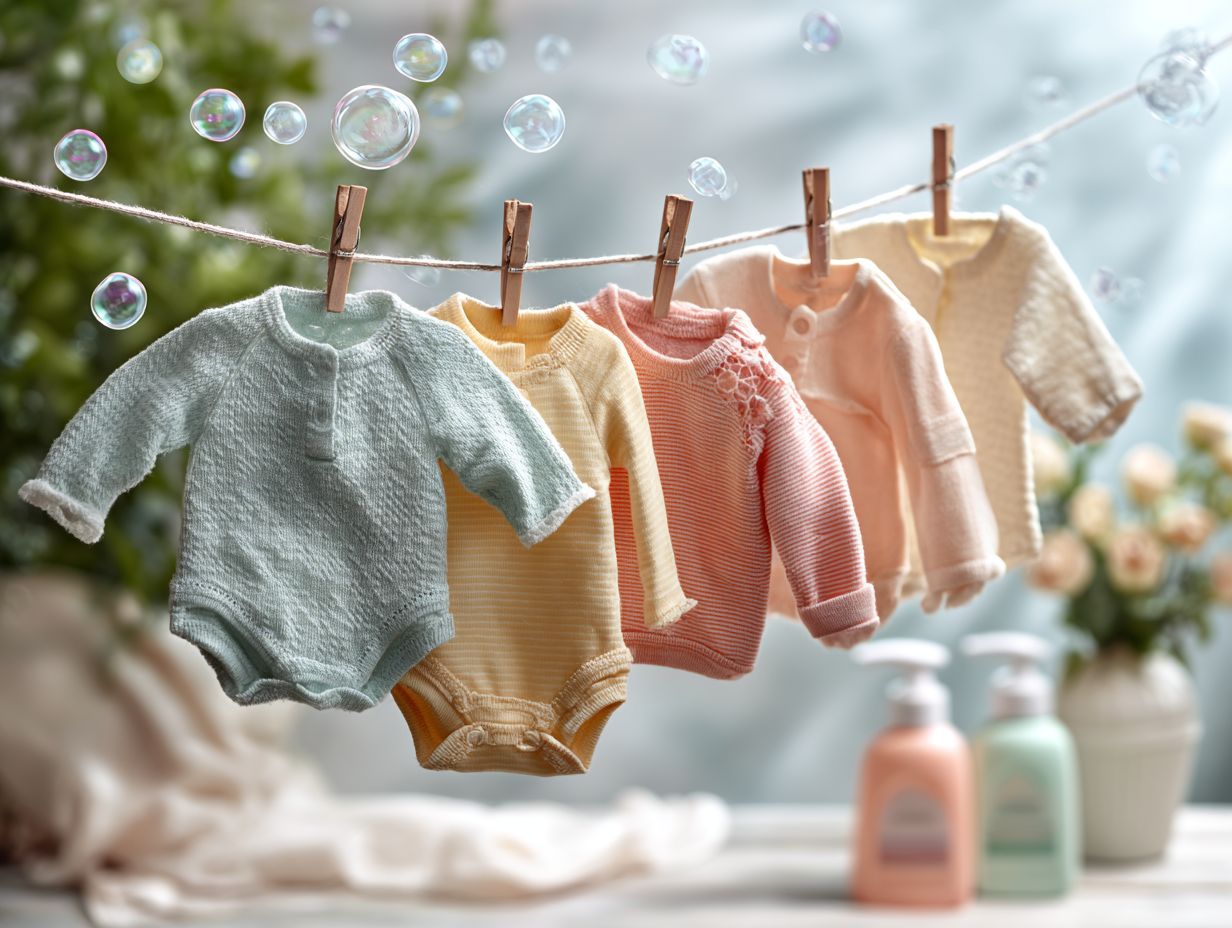
Choosing the best detergent is important to keep baby clothes clean and free from things that might cause irritation. Ensuring that these clothes retain their color and quality can be quite challenging, especially with frequent washes. Understanding how to prevent color fade in clothes can be quite beneficial for maintaining the longevity of your baby’s garments.
Baby Clothes Care and Chemical Safety Statistics
Chemical Content in Baby Clothing: Chemical Levels in Baby Clothes
The Baby Clothes Care and Chemical Safety Statistics highlight critical concerns regarding chemical safety in baby clothing. This data is important for assessing the possible health dangers related to chemical contact in clothes made for babies, who are especially sensitive to toxic materials.
The dataset on Chemical Content in Baby Clothing reveals several alarming figures. 20% of baby clothing contains high chemical levels, indicating that a significant portion of these products may expose infants to potentially harmful substances. This statistic shows the need for careful monitoring and stricter regulations to protect the health of infants.
- One particularly concerning statistic is the Shein jacket lead level, which is 20 times the safe limit. This finding shows the importance of testing and following safety rules because too much lead can cause serious health problems like growth delays and brain damage.
- Furthermore, the data shows that 64% of clothes tested positive for PFAS (per- and polyfluoroalkyl substances), a group of chemicals linked to various health problems, including thyroid disease and immune system effects. Their presence in baby clothing is particularly concerning due to the potential for long-term exposure and accumulation in the body.
This statistical summary highlights the immediate need to raise awareness and take action about chemical safety in baby clothing. Parents, companies, and government agencies need to focus on testing chemicals and being open about their use to make sure these products are safe. Choosing safer materials, enforcing stricter safety rules, and doing regular product testing can help shield infants from harmful chemicals and support healthier results.
Choosing Hypoallergenic and Fragrance-Free Options
Hypoallergenic and fragrance-free detergents are recommended for washing baby clothes to prevent skin irritations. Some reputable hypoallergenic detergents include:
- Seventh Generation Free & Clear: Made with plant-based ingredients, it’s free from dyes and fragrances, ideal for sensitive skin.
- Babyganics 3X Laundry Detergent: This is formulated with plant-based ingredients and avoids harsh chemicals, catering specifically to infants’ delicate skin.
- Molly’s Suds Laundry Powder: An eco-friendly option with minimal ingredients, it’s both effective and safe for babies.
Before using a new product, always test it on a small section of clothing to see if there are any negative effects.
How to Dry Baby Clothes Safely?
Using the right drying techniques is important to keep baby clothes soft and clean.
Air Drying vs. Machine Drying Considerations
Choosing between air drying and machine drying can significantly impact the condition of baby clothes over time. Air drying is gentle on fabrics, often preserving softness and preventing shrinkage. To air dry effectively, hang clothes in a shaded, well-ventilated area to minimize sun damage.
In contrast, machine drying offers convenience and speed but can lead to fabric wear and color fading. If you choose to dry clothes in a machine, set it to low heat and take them out right away to prevent wrinkles.
Both methods have their merits, so consider a mixed approach: air dry items prone to shrinking and machine dry others for quick turnaround.
How Often Should You Wash Baby Clothes?
How often you wash baby clothes depends on how they’re used, including spills, drooling, and diaper changes.
Frequency Based on Usage and Spills
Knowing how often baby clothes are used can help parents set a suitable laundry routine. To make a useful washing routine, think about what your baby does daily. Clothes that you wear daily often need to be washed every 2-3 days. If your baby frequently spits up or has diaper leaks, change the diaper every day.
Keep track of seasonal conditions-warmer months may necessitate more frequent laundering due to sweat. For stains, pre-treat with a gentle stain remover before washing to maintain fabric integrity. Tools like a mesh laundry bag can protect delicate items, ensuring they last longer through frequent cleaning.
What are Common Mistakes to Avoid When Washing Baby Clothes?
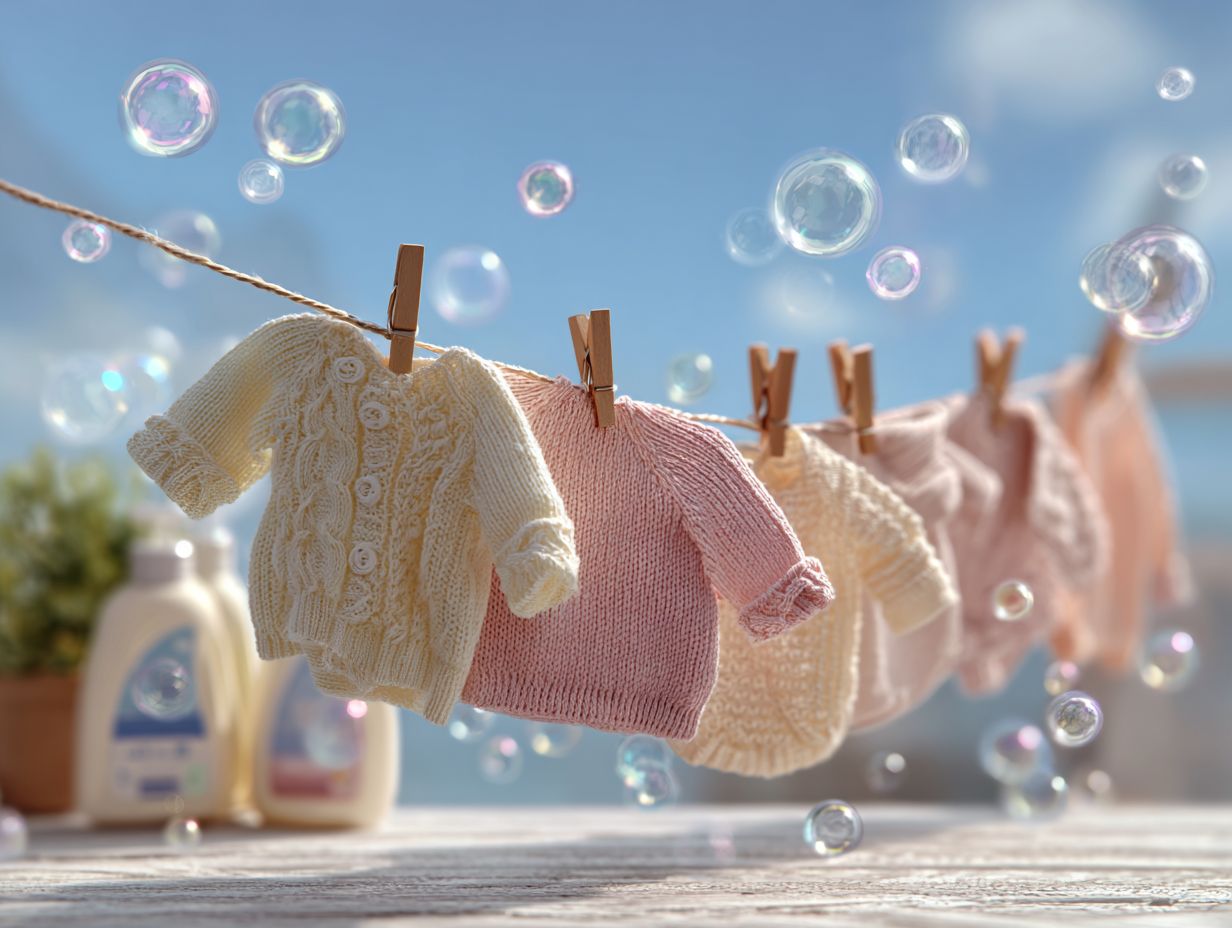
Avoiding common laundry mistakes helps keep baby clothes in good shape and safe for your baby.
Fabric Care Labels and Common Mistakes
Fabric care labels give important details that help avoid ruining baby clothes when used properly. To interpret these labels, look for common symbols and their meanings. For example, a tub with water indicates machine washing, while a triangle signifies bleaching restrictions.
Parents often misinterpret drying instructions; a square with a circle indicates tumble drying is acceptable, whereas a line means air drying.
Avoid errors by testing a small area before washing, separating whites from colors, and always adhering to the lowest temperature settings.
Creating a reference guide for these symbols can make laundry simpler, helping clothes stay in good shape for a longer time.
How Can You Make Baby Clothes Last Longer?
To extend the lifespan of baby clothes, proactive care and mindful laundering practices are essential.
Start by washing baby clothes in cold water with a gentle detergent free from harsh chemicals. Products like Seventh Generation or Babyganics are specifically formulated for sensitive skin.
Avoid fabric softeners, as they can irritate delicate skin and reduce absorbency. For storage, keep clothes in a cool, dry place, using breathable bins or cotton bags to prevent mildew.
Look for stains regularly and clean them immediately with baking soda and water to avoid permanent marks. Following these steps will help maintain both the quality and safety of baby garments.
What Additional Care Tips Should You Consider?
Besides washing, extra care methods can greatly improve how long and how clean baby clothes stay.
Storage, Stain Removal, and Seasonal Care
Storing baby clothes correctly and removing stains quickly are important for keeping them clean and available for use.
To store baby clothes effectively, start by organizing them by size and season. Use clear bins or vacuum-sealed bags to save space and keep items visible.
To get rid of stains, promptly apply a mixture of baking soda and water. Apply the paste and leave it for 15 minutes, then wash with cold water.
In spring and summer, wash clothes in mild detergent to maintain fabric quality, while in fall and winter, consider using a gentle fabric softener to counteract cold air dryness. This routine makes transitions between seasons smoother.
Why Choose Professional Laundry Services for Baby Clothes?
Choosing professional laundry services can help you save time and make sure that baby clothes are washed well and safely. Understanding why professional laundry is more hygienic than home washing can provide peace of mind as these services often adhere to higher standards of cleanliness and sanitation. See also: Why Is Professional Laundry More Hygienic Than Home Washing.
Benefits of Using The Laundry Hub in Dubai
The Laundry Hub provides excellent laundry services designed for the specific needs of parents in Dubai. With features like doorstep pickup, parents can save time. The professional cleaning methods make sure that even the hardest stains are treated carefully, giving you confidence.
Real-time tracking allows users to monitor their laundry status via the app, so parents are always informed without unnecessary anxiety. The app-only deals provide cost-effective choices, simplifying laundry tasks during a busy day.
By utilizing these services, parents can focus more on their children and less on household chores.
How to Access The Laundry Hub Services?
Using The Laundry Hub is easy with their mobile app available for Android and iOS.
Step-by-Step Guide to Using the App and Services
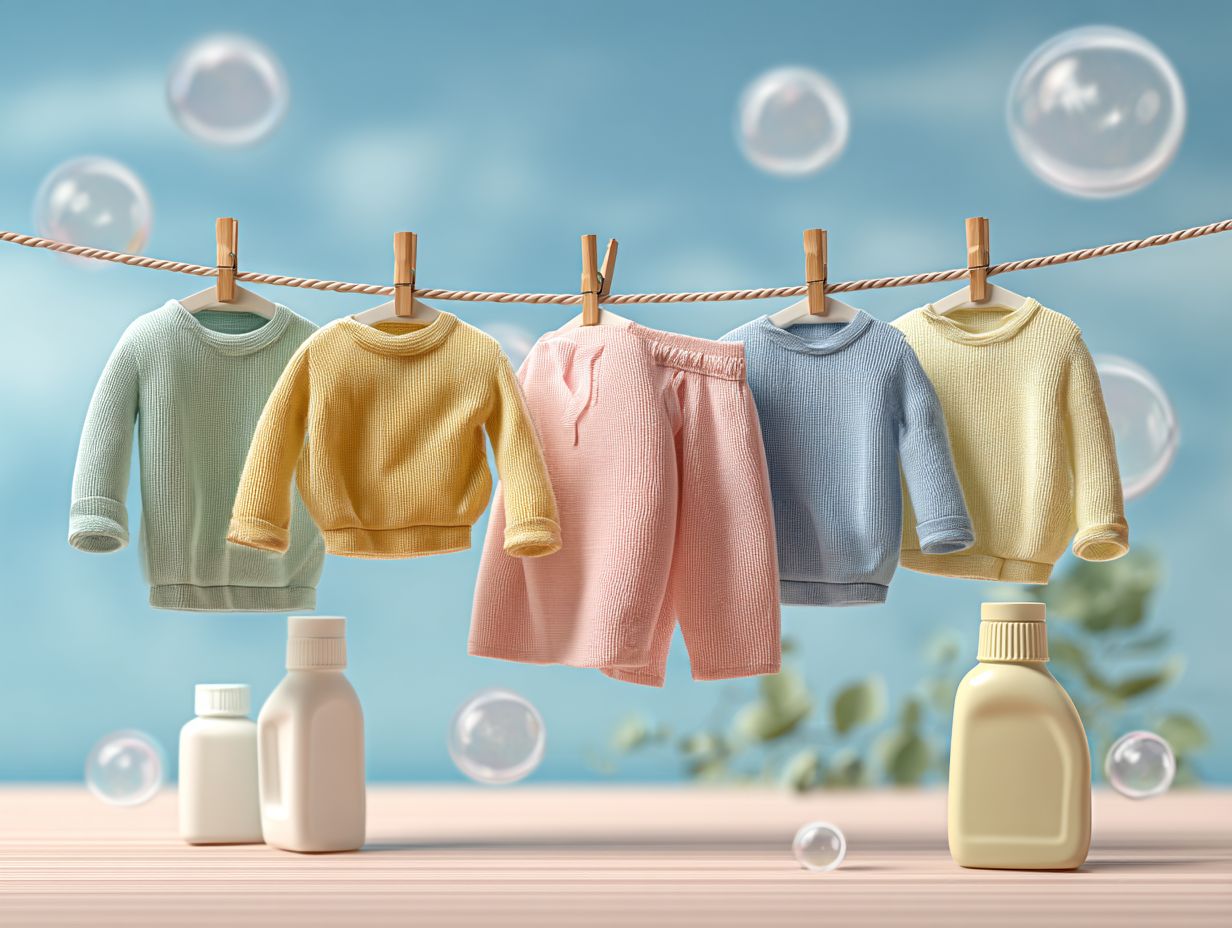
Using the The Laundry Hub app can make doing laundry easier and give you confidence.
To get started with The Laundry Hub., follow these steps:
- Download the app from your device’s app store.
- Create your account by entering your email and setting a password.
- Schedule a pickup by choosing the time and place that work best for you, fitting easily into your hectic routine.
- Choose your services, such as wash and fold or dry cleaning, tailoring your order to specific needs.
Enable real-time tracking to get updates so you always know the status of your laundry.
Frequently Asked Questions
1. How often should I wash my baby’s clothes?
It’s best to wash your baby’s clothes after each wear because babies have delicate skin and their clothes can get dirty quickly. If your baby has sensitive skin or allergies, wash their clothes after each use.
2. Can I use regular detergent to wash baby clothes?
No, regular detergent can be too harsh for your baby’s delicate skin. It is best to use a gentle detergent specifically designed for babies, as it is free from harsh chemicals and fragrances.
3. Should I wash my baby’s clothes separately?
It is recommended to wash your baby’s clothes separately from the rest of the laundry. This keeps their clothes safe from strong chemicals or germs from other clothes.
4. How should I wash cloth diapers?
Cloth diapers should be washed separately from other clothes in hot water with a gentle detergent. Avoid using fabric softeners or bleach, as they can irritate your baby’s skin.
5. Can I use a dryer to dry my baby’s clothes?
It is best to air dry your baby’s clothes to avoid shrinking or damaging them. If you do use a dryer, make sure to use a low heat setting and remove the clothes as soon as they are dry.
6. Does The Laundry Hub offer special services for washing baby clothes?
Yes, The Laundry Hub offers a special baby clothes washing service with gentle care for your little ones. You can enjoy doorstep pickup, expert cleaning, and app-only offers that save you time and money. Download their app on both Android and Apple platforms for a convenient and hassle-free laundry experience.

